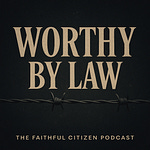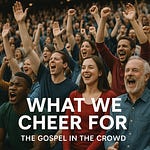From Red Letters to Red Strings: A Crisis of Christian Credibility
There was a time when identifying as a "Red Letter Christian" carried significant meaning. The term, derived from Bibles that highlight the direct words of Jesus in red ink, signified a commitment to centring one's faith and life around His core teachings: compassion, justice, humility, mercy, and truth. These were believers dedicated to embodying the spirit of Christ's explicit commands.
However, the past decade has witnessed the ascent of a different archetype: not followers of the red letters, but adherents to "red strings". This imagery evokes the chaotic, string-laden walls of conspiracy theorists, where disparate pieces of information are obsessively and often arbitrarily connected to form a predetermined narrative. Increasingly, this is the image that confronts the public when observing Christians online; not individuals anchored in thoughtful truth, but voices echoing with frantic energy, peddling conspiracies, pseudoscience, and fear. This shift signals a crisis of credibility, where the allure of simple answers to complex anxieties, or the sense of possessing special, hidden knowledge, can overshadow foundational Christian virtues.
Understanding the Christian Context (for Outsiders Looking In)
Christianity is far from a monolithic entity. Yet, particularly within North American, predominantly white evangelicalism, a distinct subculture has crystallized, complete with its own media ecosystems, educational institutions, artistic expressions, celebrated figures, and unique vernacular. For decades, this subculture has often instilled in its members a cautiousness, even suspicion, towards "the world,” a term frequently encompassing secular culture, progressive values, mainstream scientific consensus, and governmental bodies. This defensive posture, partly a reaction to historical shifts like modernism and increasing secularization, intensified from the 1970s onwards, as American evangelicals were urged to form a "moral majority" to counteract perceived societal decay. While sometimes rooted in a genuine desire for holiness, this siege mentality inadvertently bred suspicion, leading to an insular information ecosystem where the message became: "We are the last bastions of truth in a world steeped in falsehoods". This narrative, potent and persistent, left many susceptible to fear-based reasoning; fertile ground for conspiracy theories to take root.
The Rise of the Red String Christian
A "Red String Christian," therefore, is not merely an individual who entertains unusual beliefs. It is someone who constructs an entire worldview from a foundation of paranoia, pervasive distrust, and uncorroborated claims, yet cloaks this framework in spiritual language. Consider these examples:
QAnon: This sprawling, unfounded conspiracy theory, which posited that a clandestine cabal of Satan-worshipping pedophiles was being secretly dismantled by Donald Trump, found surprising traction among many Christians, especially in the U.S.. Prayer groups adopted QAnon hashtags, and some pastors even alluded to its tenets from the pulpit. When its prophecies inevitably failed, many adherents, much like historical apocalyptic cults, simply recalibrated their expectations rather than questioning the premise, often twisting scriptural interpretations of end-times to fit the narrative. The real-world harm manifested in heightened political polarization and, for some, participation in events like the January 6th Capitol riot.
COVID-19 and the Anti-Vaccine Movement: The pandemic unleashed an explosion of misinformation. False narratives about vaccines—alleging they contained microchips, altered DNA, or constituted "the mark of the beast" (a misapplication of Revelation)—were widely disseminated by Christian influencers. The thoroughly debunked video "Plandemic" achieved viral status within church-affiliated Facebook groups. Some congregations, citing "religious freedom," defied public health mandates, refusing masking or social distancing, which tragically led to COVID outbreaks and fatalities within those communities.
Flat Earth and Climate Denial: While the majority of Christians align with scientific consensus, a vocal fringe has rejected established scientific facts. Some popular Christian YouTubers, for instance, argue for a flat earth, often misinterpreting biblical passages to support their claims. Similarly, climate change is dismissed by others as a globalist hoax or deemed irrelevant due to beliefs that "God controls the weather" or that the Second Coming obviates any need for environmental stewardship.
Psychology and Mental Health: A concerning trend within some Christian content involves the rejection of psychology as a "secular religion". Conditions like ADHD or anxiety are sometimes framed as manifestations of sin or a deficiency in faith. Believers may be warned against seeking therapy unless the therapist is explicitly "biblically grounded," thereby reinforcing shame and isolation for those grappling with mental health challenges.
The World Economic Forum and the "One World Government": Apocalyptic imagery, particularly from the Book of Revelation, is frequently co-opted to demonize global institutions like the WEF, UN, or IMF. Vaccine passports, carbon taxes, or international cooperative efforts are interpreted as harbingers of a totalitarian "one world government," regardless of the actual policy content or democratic processes involved.
These are no longer fringe beliefs confined to obscure corners; they have permeated mainstream discourse in some churches. Individuals who once quoted Scripture now share grainy, unverified memes. Journalists are reflexively dismissed as "fake news," scientists as "puppets," and fellow Christians who dissent are labeled "compromised" or "woke".
How Humans Learn and Why We're All Susceptible
It is crucial to understand that susceptibility to misinformation is not exclusive to Christians; it is a human vulnerability. However, certain factors can magnify this vulnerability within church contexts, illuminated by understanding how we learn and form beliefs:
Constructivist Learning Theory: Individuals do not passively absorb new information; they interpret it through the lens of their existing beliefs and experiences. If a new idea aligns with their current worldview (for example, a pre-existing distrust of government) even scientifically sound health guidance will be filtered through that suspicion. Similarly, positive beliefs, such as God's sovereignty, can be subtly distorted if not balanced with other theological truths, making one susceptible to simplistic or fatalistic interpretations of complex events.
Social Learning Theory: Learning occurs not only from experts but also from peers and respected role models. We tend to imitate behaviours and adopt beliefs modelled by those we admire. If a pastor or a prominent Christian influencer shares a conspiracy-laden video, their followers are more inclined to believe and share it, often amplified by social media algorithms that prioritize engagement over veracity.
Cognitive Dissonance and Confirmation Bias: When confronted with evidence that challenges deeply held beliefs, individuals often experience discomfort (cognitive dissonance) and may reject the evidence rather than rethink the belief. It is often emotionally easier to double down, seeking out information that confirms pre-existing notions (confirmation bias), than to admit error. The "sunk cost fallacy" can also play a role: the more invested one is in a belief, the harder it becomes to relinquish it, even in the face of overwhelming contradictory evidence.
Acknowledging these cognitive patterns is not an attempt to excuse the spread of misinformation, but a call for both compassion and courage; compassion for those ensnared, and courage to address the biases and fears within ourselves and our communities that allow such falsehoods to thrive.
Truth Is Not a Luxury
The tragedy extends beyond the mere acceptance of untrue statements. It is that, in this process, a segment of the Church seems to have forgotten its core identity. Christians are called to be people of truth; not only moral truth, but also factual truth, intellectual integrity, honest curiosity, humble learning, and Spirit-led discernment. The pursuit of factual truth is not at odds with faith; rather, it can be an act of worship, reflecting a God of order, coherence, and truth. Jesus did not come to provide a cryptic map for decoding global conspiracies; He came to liberate us from sin, from fear, and from the compulsion to control what is ultimately in God's hands. His pronouncements were not "Blessed are the paranoid," but "Blessed are the pure in heart, for they shall see God". If the world can no longer perceive Christ in us because He has been obscured by false flags, fabricated quotes, and flawed YouTube theology, then we have lost more than an argument; we have lost the plot. This is not merely about politics; it is about discipleship, witness, and the recovery of the profound understanding that our faith is not threatened by evidence, reason, or dialogue, but is, in fact, strengthened by them.











Share this post